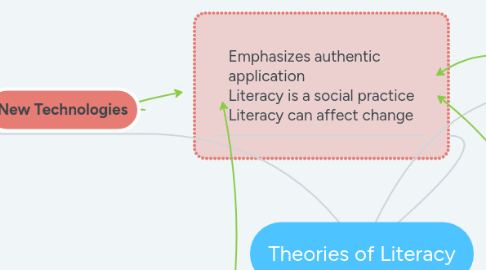Theories of Literacy
by Sarah Cooper

1. Emphasizes authentic application Literacy is a social practice Literacy can affect change
2. New Technologies
2.1. Lankshear & Knobel
2.2. use of external cumunities and application (blogs, twitter, etc)
2.3. importance of understanding both word and image
2.4. Technology is not just used to replicate traditional literacy practices
2.5. on and offline practices are fluid among each other
2.6. Teachers should be constantly building upon students' tech understanding
2.7. Multi modal
2.8. change is created through communication
3. Sociocultural Theory
3.1. Cole & Vygotsky
3.2. Problem-posing education; use of real world application
3.3. understanding is constructed by cultural systems
3.4. Co-constructed between teacher and student
3.5. students learn through participation
3.6. understanding of communities and participation within those communities is key
3.7. Development is described as change in responsibility and no role is passive
4. New Literacy Studies
4.1. Brian Street
4.2. value of experiences outside of the classroom; real world application
4.3. A communicative tool defined by social groups and rules to create meaning
4.4. being literate requires a competence across discourse communities
4.5. Focus on considering students' outside lives (culture, experiences, race, religion...) in the curriculum
5. Critical Literacy
5.1. Paulo Freire
5.2. Understanding and use of literature is related to culture, community, backgrounds
5.3. dialogue is key
5.4. focus on understanding the function of text and critical analysis of text
5.5. It is important to build on students' linguistic and literary backgrounds for guiding curriculum


